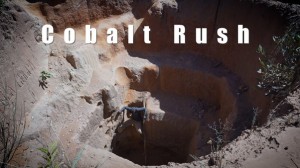A documentary film made by a team from the University of Bath is in the running for a national education award.
Cobalt Rush, which highlights the challenges faced by cobalt miners working in the Democratic Republic of Congo (DRC), has been shortlisted in the Best Educational Film (in-house production) category of the Learning on Screen Awards.

Staged by the British Universities Film and Video Council since 2005, the awards showcase the best in educational film and television.
Cobalt Rush was shot on location in Lualaba and Haut-Katanga Provinces in the DRC and sheds light on the gruelling conditions artisanal operators must endure, while at the same time exploring universal themes of ambition, hope and the obligation to make ends meet.
In 2021 the DRC was responsible for approximately three-quarters of the world’s entire production of cobalt, with southern Congo sitting atop an estimated 3.4m metric tons – almost half the world’s known supply.
Cobalt compounds are used in the electrodes for lithium-ion-based batteries, demand for which has soared over recent years given the increase in popularity for electric vehicles.

Against this backdrop, Prof Roy Maconachie from the university’s Department of social & Policy sciences and filmmaker Simon Wharf from its Audio Visual unit, along with Dr Bossissi Nkuba from the Centre for Expertise on Mining Governance at the Catholic University of Bukavu, have produced a film that tells the story of the element from the perspective of the miners at the bottom of the supply chain.
It also, ultimately, holds a mirror up to our own complicated relationship with ‘green’ technologies by exposing the invisible side of the global rush for cobalt.
Cobalt Rush builds on previous projects from Maconachie and Wharf, including Voices from the Mine, which explored artisanal diamond industry supply chains, and Gender and Fairtrade, which focused on conditions for female cocoa farmers in Ghana.
Prof Maconachie said: “We are thrilled to be nominated for the award. It’s been wonderful to work with Simon and Bossissi on this project, and a great privilege to be able to tell the complex, globally reaching stories of those working at the bottom of the cobalt supply chain in the DRC.
“Perhaps like no other medium, film has an unrivalled ability to amplify the voices of those in marginalised communities, to allow them to share their life stories on a much wider stage.
“We are delighted that our film is already receiving recognition.”
Simon Wharf added: “It’s very exciting to be nominated for this award. This was a wonderful project to be part of and such an important and timely story to tell.”
The awards will be presented at a ceremony at the British Film Institute (BFI) on London’s Southbank on 4 May.
As well as celebrating a wide range of educational broadcast and professional productions, the Learning on Screen Awards also provide a platform for generations of upcoming student filmmakers.



















